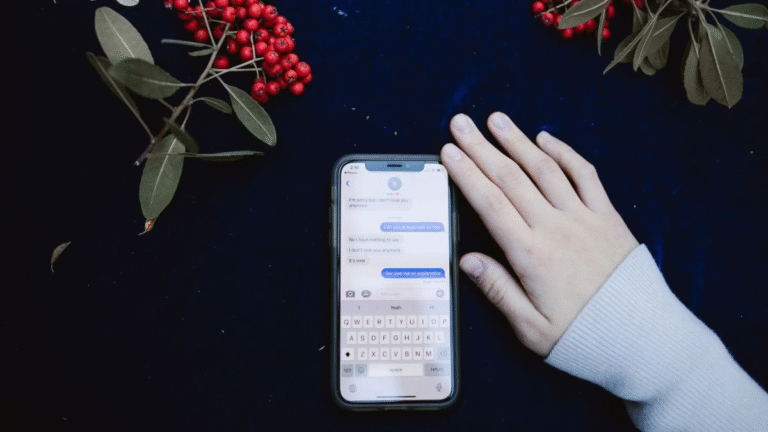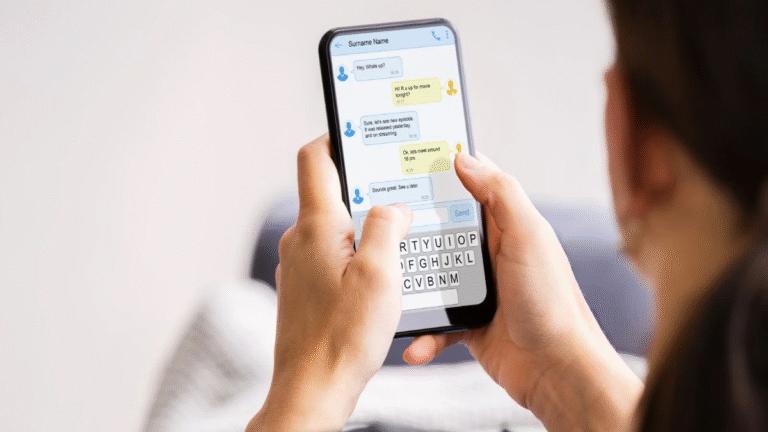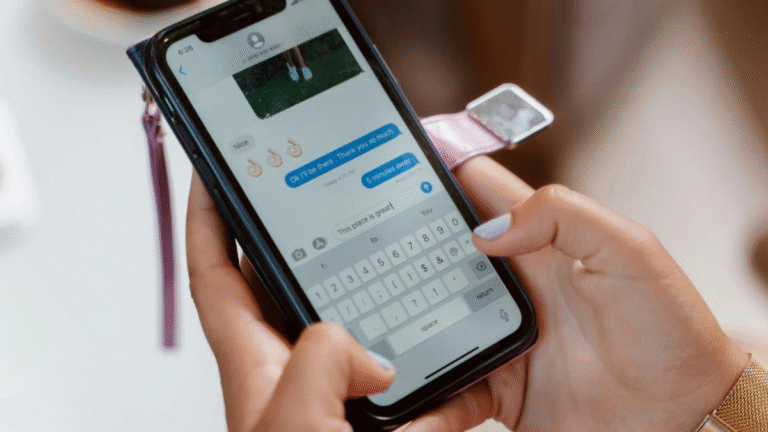What It Actually Means When They’re Slow to Reply [Stop Overthinking]
Your phone buzzes with a notification, but it’s not from him. You open Instagram and notice the small green dot next to his name, indicating that he’s ‘Active Now.‘ Despite sending your message three hours ago, it still shows as “seen.”
A wave of uncertainty washes over you, and you begin to question your actions. Is he ignoring you? Is he engaged in a conversation with someone else? Did I say something inappropriate?
This feeling of digital whiplash is incredibly common. You notice that he’s on his phone, but you’re not the center of his attention. The immediate assumption is often personal that it’s a reflection of his feelings for you. But is it truly about you?
This article will guide you through the intricacies of contemporary dating. We’ll explore the psychological factors that contribute to this dilemma, identify common communication pitfalls to avoid, and offer proven strategies to manage anxiety and cultivate a deeper connection.
Understanding Digital Communication in Modern Dating
First and foremost, let’s establish a fundamental truth: online activity doesn’t necessarily imply that someone is available. For instance, a person might be “active” while passively scrolling through reels during a work break, listening to music on YouTube, or responding to a family group chat.
This activity is often low-effort and vastly different from the mental energy required to craft a thoughtful reply to someone you care about.
From a psychological standpoint, this situation can trigger intermittent reinforcement, a potent and anxiety-inducing cycle. His unpredictable and sometimes rapid responses create a constant loop of checking your phone, hoping for a reply that serves as a “reward.”
This fixation on his response time is akin to the addictive nature of slot machines. Moreover, we frequently engage in a cognitive distortion known as “mind-reading,” where we assume we comprehend his negative intentions without any concrete evidence.
A 2023 report reveals that the average person spends over 2.5 hours daily on social media, frequently switching between multiple apps. This online presence often reflects modern multitasking habits rather than genuine feelings for you.
Common Challenges & Why It Causes So Much Anxiety
Let’s delve into a brief narrative. Sarah was in a relationship with Mark. She noticed that he would post stories on Instagram hours after she had asked him a question via text.
This made her feel neglected and unimportant. She would draft and delete angry messages, spiraling into a state of frustration.
One day, she finally broached the subject, and Mark was genuinely taken aback. He explained that he had a habit of opening Instagram while waiting for a work file to download, and he didn’t even realize he was “active.”
He preferred to respond to her when he could give the conversation his undivided attention. Sarah’s experience highlights the universal challenges that individuals face.
- Jumping to the worst-case scenarios by assuming someone is disinterested or unfaithful without any concrete evidence.
- Sending accusatory follow-ups, like texting something like “I see you’re online…”, can lead to conflict.
- Allow texting anxiety to consume your thoughts and affect your mood, ruining your entire day.
- Becoming a Digital Detective: He compulsively checks his ‘last seen’ or ‘active now’ status on various platforms.
Proven Strategies Backed by Psychology
Instead of allowing anxiety to dominate your thoughts, you can regain control by employing these practical strategies grounded in the principles of relationship psychology.
1. Challenge Your Anxious Thoughts (CBT)
Cognitive Behavioral Therapy (CBT) teaches us to question our automatic negative thoughts. When you think, “He’s ignoring me,” pause and challenge that thought.
- Ask yourself: “What’s a more likely, alternative explanation?”
- Reframe it: “He’s probably busy with work or just decompressing. He’ll reply when he has the mental space.”
2. Understand Your Attachment Style
Your reaction to this situation might be influenced by your attachment style. If you have an anxious attachment style, you might crave constant reassurance and perceive a delayed response as a sign of abandonment. On the other hand, he might have an avoidant attachment style and feel overwhelmed by constant communication, requiring space to recharge.
Understanding this isn’t about assigning blame; it’s about recognizing patterns so that you can address the underlying needs, rather than just focusing on the symptom (texting).
3. Use a “Soft Start-Up” (The Gottman Method)
Dr. John Gottman, a renowned relationship expert, strongly advises against initiating conversations with criticism or blame. Instead of resorting to an accusatory “Why do you take so long to reply?”, consider starting the conversation with a soft approach that centers around your feelings and a positive need.
- Here’s a practical example: “I understand you’re juggling a lot, and I genuinely enjoy our conversations. However, I sometimes feel a bit disconnected when there are long gaps between our texts. Would you be open to a quick call later tonight instead? I’d love to hear your voice.”
Tools & Apps That Can Help
Building better communication habits can be made easier with the right tools. These resources are specifically designed to facilitate connection beyond the confines of screens.
- Lasting : A guided couples counseling app that helps you and your partner understand each other better through sessions on communication, conflict, and connection.
- Talkspace : Offers online couples therapy with licensed professionals, making it easy to get expert guidance on your schedule.
- Gottman Card Decks : A free app from relationship experts with digital card decks filled with questions and prompts to spark deeper, more meaningful conversations.
Expert Insights & Reliable Sources
You’re not alone in feeling this way. Relationship experts universally agree that the quality of communication is more important than the quantity and speed.
As highlighted in an article from Psychology Today, “the expectation of immediate availability is a recipe for anxiety and misunderstandings in contemporary relationships.” This pressure for instant replies disregards the reality of life’s other demands.
Dr. Sue Johnson, the developer of Emotionally Focused Therapy (EFT), stresses that the crucial question isn’t “How quickly does he text?” but “Are you present for me?” This sense of security and emotional connection is cultivated through meaningful interactions, such as a focused phone call or quality time spent together, rather than through constant, low-effort texting. For more insights on managing relationship anxiety, Verywell Mind provides excellent articles on the subject.
Conclusion & Your Next Step
Seeing him active online while you’re waiting for a reply is a uniquely modern form of emotional turmoil. However, it’s important to remember that his digital habits don’t necessarily reflect his feelings for you. They’re a reflection of the distractions and multitasking that characterize our modern world.
By confronting your anxious thoughts, comprehending their underlying psychology, and communicating your needs calmly and effectively, you can break free from the cycle of texting anxiety.
Your peace of mind is more valuable than a quick response. Instead, prioritize building a meaningful connection that extends beyond the digital realm.
Frequently Asked Questions (FAQ)
It’s not necessarily a definitive indicator. It’s just one possibility among many. A more reliable sign of interest is the overall pattern of his behavior. Does he still initiate plans? Is he engaged and present when you’re together? The quality of his replies, when he does send them, often holds more significance than the speed at which they are sent.
There’s no universal rule. It depends on the stage of your relationship and your established communication patterns. The real question is: how does it make you feel? If it consistently causes you distress, it’s a valid issue to address calmly.
Yes! Apps like the Gottman Card Decks act as conversation starters. They provide structured prompts and questions that can help you and your partner explore topics and connect on a deeper level than everyday texting allows.
While it may seem tempting to play games, they often lead to increased distance and confusion. In the long run, authentic and direct communication is always the more effective strategy. While mirroring his behavior might temporarily protect your pride, it won’t address the underlying feeling of disconnect.
Use a “soft start-up” that emphasizes a genuine desire for connection. For instance, you could say, “Hey! I miss talking to you. I understand that texting can be overwhelming during the day, but I’d really appreciate it if we could set aside some time to catch up properly soon.” This approach highlights your value for the connection, rather than accusing him of his behavior.

![What It Actually Means When They're Slow to Reply [Stop Overthinking]](https://coupleuni.com/wp-content/uploads/2025/08/IMG_2374.png)




![How to Text Your Ex Without Seeming Desperate [4 Rules]](https://coupleuni.com/wp-content/uploads/2025/08/PHOTO-2025-08-24-13-07-10-768x432.png)
